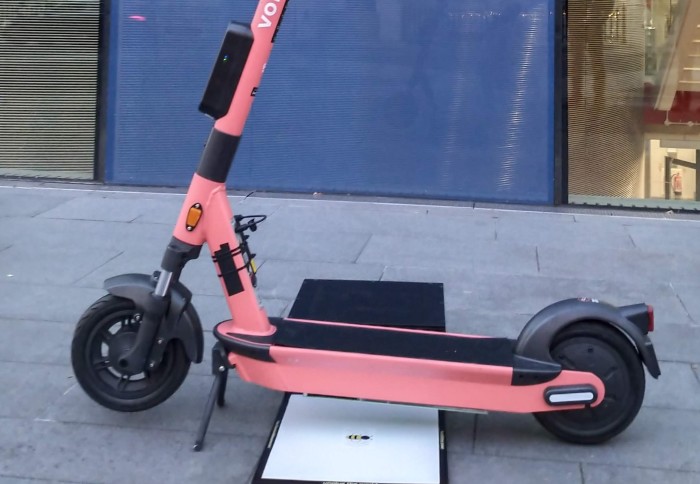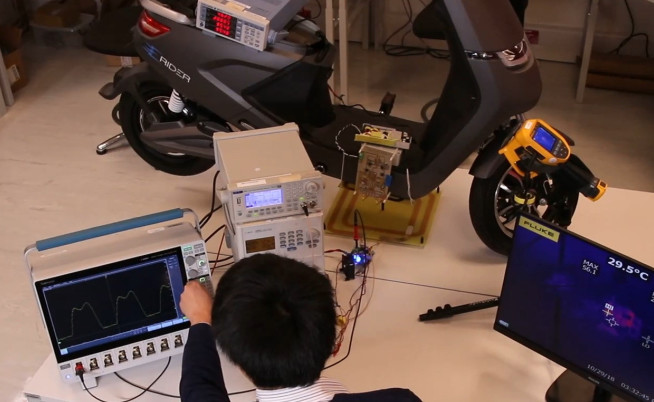Bumblebee Power takes flight
by Jane Horrell

A Voi scooter with an integrated wireless charging receiver, over a wireless charging pad that can be embedded in the pavement
Imperial College spin-out company Bumblebee Power Ltd has launched with a new partnership focused on micro e-mobility.
Co-founded by Professor Paul Mitcheson and Dr David Yates, Bumblebee Power's latest generation wireless power technology has been developed in the Wireless Power Lab in the Department of Electrical and Electronic Engineering.
The team has previously raised £5 million in funding to develop the underlying technology alongside a £200,000 in Impact Acceleration grant funding that has allowed it to develop prototypes including wireless charging of reconnaissance drones in collaboration with Thales.

By 2030, the shared electric micro-mobility market is expected to spend more than £140bn on battery charging.
Bumblebee’s wireless solution complements existing charging technologies, such as battery-swapping, and enables a host of other operational and environmental benefits.
Wireless power technologies can provide a solution, but existing technologies require very precise positioning and use expensive, heavy materials.
Bumblebee Power’s wireless charging technology offers:
- three times the wireless range
- three times the tolerance to misalignment
- three times lighter than current solutions
A powerful new partnership
“Bumblebee’s technology addresses key concerns about environmental pollution reduction, effective use of public space with its unobtrusive and highly efficient wireless charging systems.” David Yates CTO Bumblebee Power
Now Swedish micromobility startup Voi is partnering with Bumblebee to explore the potential of wireless charging for its fleets of e-scooters and e-bikes.
Bumblebee has retrofitted a Voi e-scooter with a wireless charging receiving unit to demonstrate the potential of the technology. A thin and lightweight receiver coil and charger unit is attached to the scooter, and a charging pad below the scooter, which consists of a thin printed circuit board-based coil and control unit, transfers power wirelessly.
The charging pad could be connected to the energy grid and can be attached to the ground. Wireless charging pads could then be built into designated areas for rental e-scooters, allowing them to be charged while not in use.
“Voi is constantly on the lookout for innovative solutions that will accelerate the micromobility revolution,” said Fredrik Hjelm, CEO and co-founder of Voi.
“As more cities adopt electric vehicles and micromobility transport in response to growing concerns over air pollution and congestion, the need for efficient, sustainable, and scalable operations becomes ever greater.
“We are proud to support the research and development that will further these goals by working with a world-leading institution such as Imperial College and Bumblebee Power. We’re aiming for long-term charging solutions that secure the future of micro-mobility.”
David Yates says Bumblebee Power is proud to be collaborating with Voi. “We share a common vision to explore how Bumblebee’s versatile, practical and innovative technology can transform the use and operation of micro-mobility vehicles.
“Bumblebee’s technology addresses key concerns about environmental pollution reduction, effective use of public space with its unobtrusive and highly efficient wireless charging systems.”
An exciting future
Paul Mitcheson believes there is an exciting future for wireless charging of our vehicles and devices:
“When WiFi first came out – it took a few years before it was good enough for people to stop plugging their laptops into an ethernet socket. Nowadays, you would never think to plug a laptop in for a network connection. Wireless power has so far been slow to be adopted — I hope in the future that with the application of a decade’s worth of research in wireless power people will not think twice about charging devices wirelessly.”
Congratulations to Bumblebee Power on your launch — we are looking forward to reporting on your future successes.
Report adapted from Voi / Bumblebee press release.
Article text (excluding photos or graphics) © Imperial College London.
Photos and graphics subject to third party copyright used with permission or © Imperial College London.
Reporter
Jane Horrell
Department of Electrical and Electronic Engineering